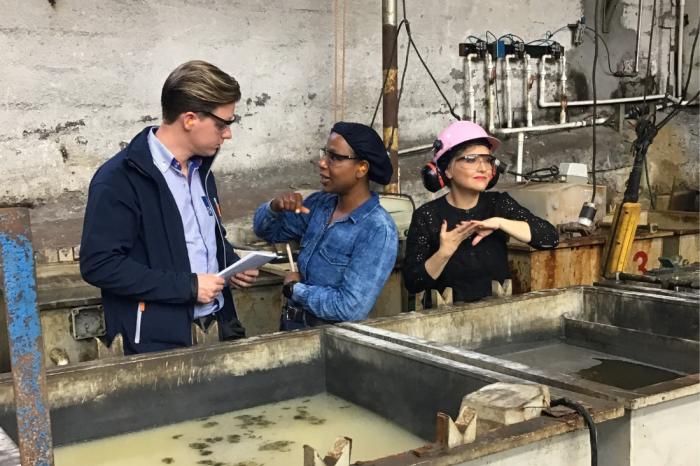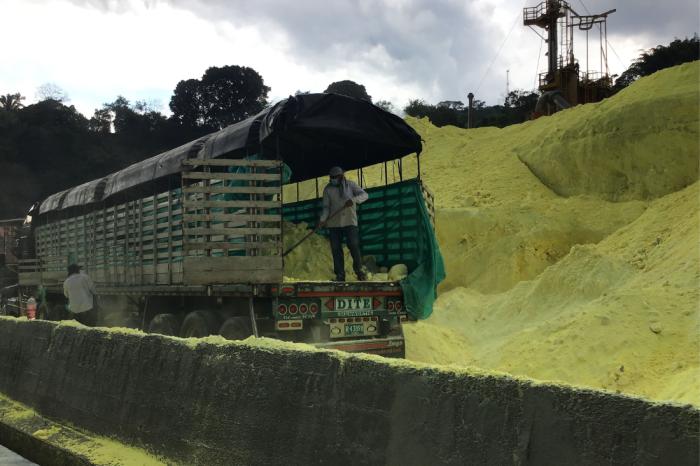“It’s normal for us to live below sea level, have sufficient water, few floods and a clean living environment. Water is essential. It is the basis of all life. I have always been aware that I was born in a nice country, but I appreciate it even more after my trip to Colombia”, says an enthusiastic water board employee.
Andras just returned from a trip to the South American country, where life is very different from ours. “It is more relaxed there, and people are more connected to the environment. For example, we often no longer know where our food comes from. On the other hand, we are more climate-conscious in the Netherlands. Colombia still has a lot to gain on that front.”
The Blue Deal programme initiates projects in various places around the world. The project in Colombia is called ‘InspirAgua’. “The name says it all, actually: we inspire each other and share our water knowledge. So we don’t set their priorities; they do that themselves. We supply them with knowledge and experience, and we cooperate in various areas at several locations”, he explains.
“I was mainly focused on work in licensing, supervision and enforcement during my trip. Those areas are quite underdeveloped there. I also investigated how prepared the area is for climate change. The extreme rainfall in the country immediately caught my eye. And this has major consequences: the earth becomes too moist, causing part of the mountain to shift. This could block important access roads. Moreover, a beautiful and calm river becomes a swirling brown river in no time.”

Since there is little money for interventions, the river isn’t being controlled. Nature gives it the space it needs. “Perhaps a lack of funding is why the water system isn’t fragile. The extremes that El Nino and La Nina brought are already such that the country is partly naturally adapted to them. But acceptance of flooding is much greater in Colombia than in the Netherlands. Our country is quickly disrupted after heavy rains, flooding basements and streets.”
Andras also sees another big difference with our country. “In Caldas, a department with 100,000 inhabitants, most wastewater from households and businesses is discharged directly into the river. That water is used for various activities further downstream. It would be good if there were strict requirements regarding the discharge of dirty, and therefore sometimes dangerous, water. Risks to the environment are direct risks to public health. That awareness desperately needs to increase. We have talked a lot about that with each other. We show that things can be done differently. We help them on their way by doing this, but ultimately they have to do it themselves.”

The group also visited a company that makes machetes. “1,000 people at work with lots of hazardous substances. I was shocked by the working conditions and the fact that they discharge this water with the substances in it back into the river. This is unthinkable in our country! Together with the local authorities, we gave the company recommendations on how to dispose of the wastewater. We shared our findings with the local environmental authorities. There is, however, a lot of corruption in Colombia. Politicians, senior officials and companies are in close contact with each other. You have to take that into account. There is no health and safety service, and the volatile fumes and risks employees face are unprecedented. But people are happy simply having a job.”
Andras and his colleagues did not only bring knowledge and experience to Colombia. They also learned a lot themselves. “I take knowledge back, allowing me to improve my work. The group contact is precious; we learn a lot from each other. It’s easier to take that further in the Netherlands if you know each other.”
The Dutch expect a visit from a delegation from Colombia in June, and another working visit to the South American country is planned in November. “The project runs until 2030. That’s nice because that is long enough to make a difference. It makes my work, to which I love to dedicate myself on a daily basis, even more meaningful than it already was.”
Related article
Date: 21 March 2023 |
Source of tekst: Andras Koops, waterschap Vechtstromen |
Author: Marloes Neeskens





